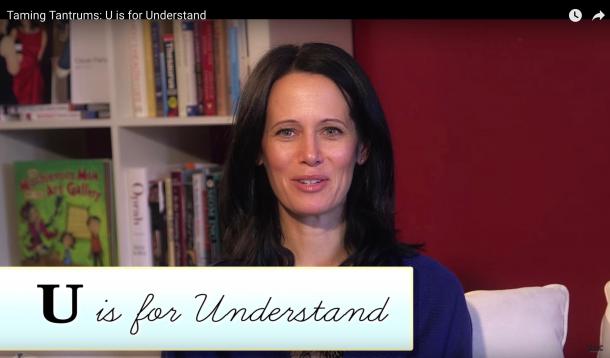
Andrea Nair here – welcome back to the A to Z of Taming Tantrums video series. This video is for the letter V, and V is for Voice.
In this short video I share my quick, yet very effective trick for getting children to lower their voices. This works for a classroom full of loud students and a house full of equally loud little people!
Give it a try!
How did it go? Please do let me know by commenting on the video or over on my Facebook page.
We're so excited to share with you the A to Z of Taming Tantrums video series!
Each week we'll share the next letter of the alphabet and Andrea will discuss how it relates to reducing tantrums - and improve our experience as parents! You can view each video here as they are added each Friday.


Parents often have preconceived assumptions about what parenting will be like. These notions might be quickly dashed when we realize that sleep deprivation is far more debilitating than anything we had imagined or that a toddler really can have a tantrum that lasts for 45 minutes straight.
But aside from the everyday challenges of parenting, many of us have ideas about how we will bond with our children and the things we will do together. Perhaps you are a mother who fantasized about taking your daughter to get her ears pierced and shopping together, but she doesn’t like these activities. Maybe you are a sports fan and are eager to take your child to baseball games, but he hates sports.
Maybe you love to read and couldn’t wait to share Harry Potter and The Lord of the Rings with your child, but she dislikes reading anything other than graphic novels. Or maybe you crave peace and quiet, and your child is constantly on the go. Maybe you are outgoing and adventurous, but your child is shy and reserved.
Whatever the case may be, parents can feel disappointed if their child isn’t interested in the same activities they are. In some situations, the disappointment might come from a difference between expectations and reality. The parent had expected parental bonding to look a certain way, but the reality isn’t the same as that expectation. In other situations, the disappointment might be because the parent is unsure of how to bond with a child who has dissimilar interests.
When a child has a dissimilar personality, a parent might struggle to understand the emotions his or her child is feeling. It can be challenging to empathize with someone when you don’t understand where his or her big emotions are coming from.
Although parenting any child can be challenging, parenting a child who is very different than you can be particularly challenging for parents. One of the most important things to remember, however, is that there is nothing wrong with you as a parent if you struggle to understand one child more than another. Just because you don’t immediately empathize with your child’s feelings, doesn’t mean you love him or her any less. It simply means that you aren’t familiar with this personality type, and this way of thinking, feeling, or doing things. Let your child teach you how to be in his or her shoes.
It is also important that parents try to avoid “changing” a child to fit their expectations. One of the best things a parent can do for their children and for themselves is to see them for who they are, and work to meet them there. That does not mean that parents shouldn’t work to guide their children on a healthy path or teach them how to be a kind and compassionate person. But it does mean avoiding putting undo pressure on a child to change his or her personality prematurely, such as suggesting she “get over” shyness or “settle down” more often.
Parents can work to help children overcome unhealthy behaviours, but there is a difference between working to change behaviour and trying to change the person. By focusing on the behaviour, and relaxing expectations, parents often find it easier to bond with their child and begin to understand them for who they are.
For example, I’m quite introverted and I have an extroverted child. He wakes up full of energy, raring to play with his friends. He is constantly on the move! Although I’m quite active, I’m happy to do things by myself and rest for periods of time. Needless to say this dynamic can be quite challenging!
I started focusing on his behaviour as a thing on it’s own rather than how it related to me. I’d say things like, “It looks like you really want to play with friends. Let’s go for a walk down to the river to look for tadpoles, do some reading, then see who is around.” This is instead of: “slow down… stop tapping… get over here… not now!” I learned to work with his high energy by doing something that lets that energy out first rather than trying to get him to do tasks which require concentration right away. I pick walking in the forest because that it something I really enjoy doing so that activity helps both of us.
When a parent and child have very different interests, it can also be helpful to find some common ground. Regardless of how dissimilar a parent and child might be, there is often something that the parent and child both enjoy.
For instance, perhaps you love to read, but your child has trouble sitting still long enough to read an entire book. If this is the case, maybe you would both enjoy listening to books on tape together while you drive in the car, or reading sports magazines together instead of chapter books. Or if your child likes imaginative play, but you find it difficult, perhaps you could suggest that your child put on theatrical plays with you acting as the audience.
While it is important for parents to show their children they respect their unique interests, and meet them where they are, it can also be satisfying for a parent to introduce their child to the parent’s hobbies – in small bursts, of course. If, for instance, you are an avid baseball fan but your child dislikes sports, perhaps you could start by together reading a biography of your favorite sports player.
By combining the parent’s hobbies with the child’s interests, parents can bridge the gap and encourage a respectful bond that reinforces the validity of both people’s interests and perspectives. After all, the parent-child relationship is a relationship. And for any healthy relationship to thrive, both people need feel validated, appreciated, and loved as they are.
Is your child very different from you? I'd love to hear about things you have learned to connect with your child. Please do let me know in the comments here or over on my Facebook page.

Welcome back to the A to Z of Taming Tantrums video series! The letter I’m focusing on today is the U, and U is for Understand.
Understand what? Understand whom?
Actually, it’s a little bit of both. Understand means telling our upset children that we see their upset, we see something might have happen to trigger their reaction, and we see they are a good person.
One of the most frustrating things for a person is to believe someone either doesn’t understand or misunderstands him or her or the situation. Have you ever been in the middle of a tense situation only to have a person walk in half way and start accusing you of something that didn’t actually happen before taking the time to ask what the story is? This is certainly fodder for big reactions.
Tantrums are often de-escalated when we pause to fully understand the situation (and calm down) before considering how to respond.
The question I ask myself to keep “understanding” front of mind is this:
“I wonder what is happening in my child’s world?”
The answer to this question can often pull the tension down and keep us all focused on support and problem solving rather than pointing fingers and punishment.
I invite you to watch this video to learn more:
Consider how you can show your children that you get them—that they matter.
Do you have any questions or comments? Please feel free to post those on the YouTube video or over on my Facebook page.
We're so excited to share with you the A to Z of Taming Tantrums video series!
Each week we'll share the next letter of the alphabet and Andrea will discuss how it relates to reducing tantrums - and improve our experience as parents! You can view each video here as they are added each Friday.
